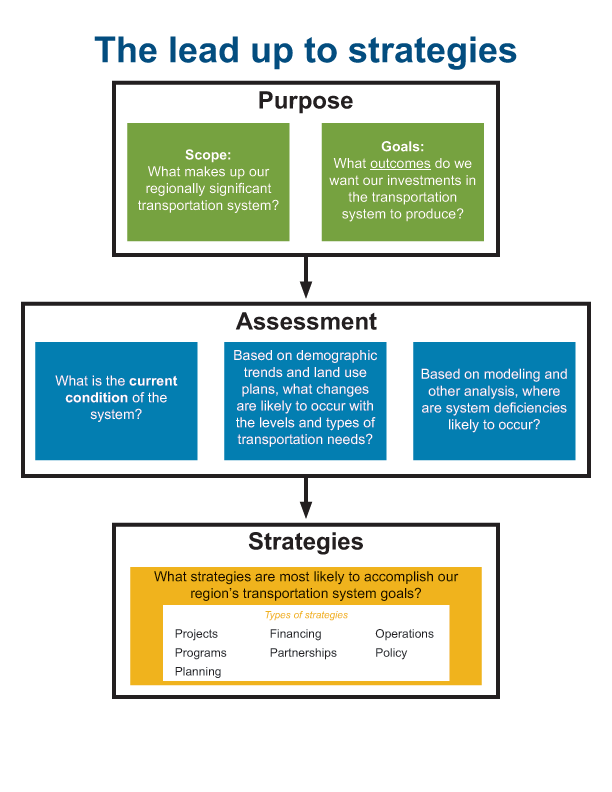Achieving the Whatcom region’s goals for its transportation system requires strategies. Figure 6 illustrates the process WCOG used to determine the following seven strategies employed in Whatcom Mobility 2040:
Figure 6: Strategy Development Process

Projects: These are carefully-considered, targeted investments for the preservation and/or improvement of specific elements of the regional transportation system, which are compiled in Whatcom Mobility 2040’s project list.
Programs: WCOG carries out two important, ongoing initiatives that optimize the effectiveness of the regional transportation system: Whatcom Smart Trips and the IMTC program. There are also other programs conducted by the region’s jurisdictions and WCOG’s partner agencies that contribute to the accomplishment of regional goals. More info
Planning: The central purpose of the comprehensive, cooperative and continuing planning process conducted by WCOG staff and overseen by the Whatcom Transportation Policy Board is to advance regional, state and national transportation goals for the benefit of the region’s residents and other users of the transportation network. More info
Financing: Paying for the region’s desired transportation system – especially with aging infrastructure and strained budgets at all levels of government – is one of the central challenges in meeting the region’s goals, but also presents opportunities to advance them. More info
Policy: Relative to the regional transportation system, policies are any number of formal decisions – either mandatory or advisory – made by local governments, facility operators (like WTA and WSDOT), state and federal regulatory agencies, and/or the Whatcom Transportation Policy Board, which are intended to influence the likelihood of a desired outcome. Typically implemented with public consultation, some examples of policy strategies are dedication of freeway lanes for high-occupancy vehicles, ramp-metering, pricing of publicly-owned parking spaces, etc. While the Policy Board is responsible for formulating and approving regional transportation investment priorities, it has no authority to establish binding policies with respect to any of its member jurisdictions’ or agencies’ own facilities. However, as it has for more than three decades, it will continue to seek consensus on regional transportation priorities, such as those contained in this plan. More info
Partnerships: Through ongoing interaction among the region’s transportation system managers and operators, opportunities to partner to achieve shared goals often present themselves. Such interaction is one of the many benefits derived from the cooperative and continuing transportation planning process that occurs in the Whatcom region, and there are many examples of successful partnerships involving Whatcom County, the cities, the tribes, WTA, the Port of Bellingham, WSDOT, WCOG, and even Canadian entities. Identifying and seizing opportunities to partner will continue to be an important strategy, not just for achieving the regional goals in Whatcom Mobility 2040 but also those of the individual jurisdictions and agencies constituting WCOG.
Operations: Responsible and efficient management of transportation system facilities and supporting infrastructure (roads, rolling stock, ferries, airports, communication infrastructure, etc.) can play an important role in achieving Whatcom’s regional transportation goals. Operators include WSDOT, Whatcom County, WTA, the cities, the tribes, the Port of Bellingham and private-sector concerns such as BNSF Railway and trucking companies. Measuring the performance of these intertwined elements is generally the responsibility of the individual operators, which is oftentimes a requirement of funding partners such as the Federal Highway and Transit administrations, WSDOT and others. Improving operational efficiency rests with the operators themselves, although their ability to do so is often constrained by inadequate funding or reliance on other entities to make improvements to their own systems. Through its facilitation of the Transportation Technical Advisory Group, which includes most of the system operators in Whatcom County, WCOG will continue to provide assistance to operators to support ongoing operational efficiency.
